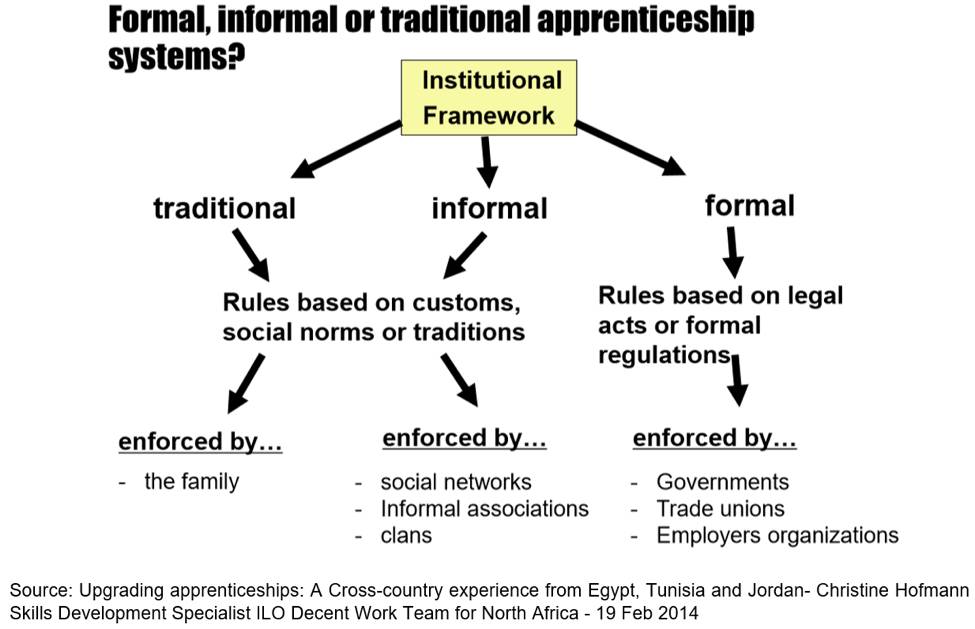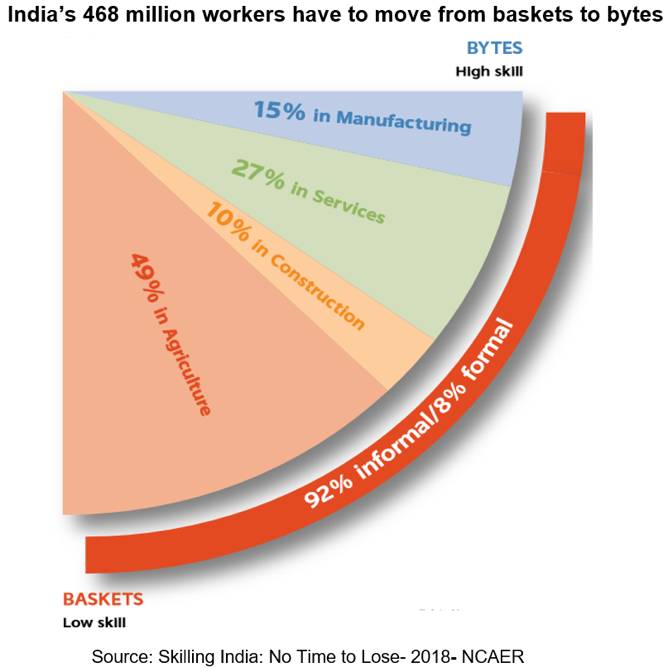Whichever way one looks, the numbers on the spread of informality in the Indian economy are alarming- a whopping 95% of the workforce.[i] According to the Economic Survey[ii] (2018) the ‘hard core’ formal sector in India representing 63% of GST liability and benefiting from any social security is a mere 0.6% of firms.
What Are Informal Apprenticeships?


A dominant part of many urban and rural economies, informal apprenticeships are often a casual oral or written training agreement between an apprentice and a master craftsperson based on ‘social sanctions, reputation or reciprocity’.[iii] Informal apprentices lack the protection of legislation, worker rights and social benefits.
Why Does It Matter?
The vast majority of the informal workforce is unskilled[iv] owing to low education and training attainment among its workers. It is estimated that 90% of 450 million jobs in India require vocational skills. Only 4% have formal vocational skills. This leads to a vicious cycle of low productivity-low wages.
“India can’t grow as a society on lower wages or on wage advantage. The next stage of growth for India can only come through higher productivity,” stated Joint Secretary MSDE Rajesh Aggarwal at a recent IAF-NETAP event.
And higher productivity can be achieved only through skilling India’s heaving mass of informal workers on industry needs and deploying them in a high growth formal sectors. The formal workforce in contrast is typically characterised by higher efficiency and higher profit margins leading to greater job-generation potential. Formalisation also increases a worker’s motivation to remain skilled on the back of competitive wages, better working conditions and social security benefits.


Bottom of Pyramid Opportunities
NCAER[v] research reveals substantial capacity across Indian service and manufacturing industries to generate good jobs, both directly and in ancillary industries. For instance, there is tremendous job-generating opportunity for both low and medium-skilled workers in manufacturing (food processing, leather products) textiles, wood and wood products, furniture and fixtures. However, the vast informal non-relevant skills structure of the Indian workforce is holding back the creation of good jobs.
Apprenticeships Only Way to Boost Formal Employment
This was unequivocally stated recently by Sumit Kumar of Teamlease Services. Many of the current central and state government earn and learn schemes are not under the remit of the Apprentice Act. Once consolidated under the Act, formal apprenticeships can be scaled up through all government skilling schemes.[vi]
A view shared elsewhere by Sandeep Kosaraju, GM, Andhra Pradesh State Skill Development Corporation. The Indian informal sector engages the majority of apprentices but is a highly self-regulating system says Sandeep. To bring informal apprentices into the fold of the National Apprenticeship Promotion Scheme, specific policy interventions are needed to support capacity building of informal workers through local industrial associations, MSMEs, career guidance, entering contracts between Master Trainers and apprentices, and boosting Recognition of Prior Learning initiatives.[vii]
Why Upgrade Informal Apprenticeships?
Owing to the preponderance of informal apprentices in a developing economy, they automatically become the most important source of skills training. However, informal apprenticeships often do not follow the principles of decent work:iii
- No set work hours
- Very low wages
- No social protection, health and safety considerations
- A route for exploitation- unfair treatment at the hands of a master craftspersons; child labour
The primary advantage of upgrading informal apprenticeships is to aid youth transition into decent work. Formal TVET systems are often out of reach of disadvantaged youth. Upgrading informal apprenticeships becomes a cost- effective bridge to boost youth employability as training through apprenticeships is fused into the production process, with tools and techniques required to master a trade. The training becomes an ‘investment’ between the master craftsperson and apprentice with flexibility to impart skills to even poor youth.iii
How Can It Be Done?
Thorough appreciation of local circumstances and the motivations of both master craftspersons and apprentices is key for interventions to upgrade informal apprentices, including the experience of small businesses with government skilling programmes. Then come the steps of actually formalising the process:iii
- Detailed contracts
- Expected competency levels at end of training
- Trainer and apprentice rights
- Remuneration and national minimum age legislation
- Liability issues and conflict management processes (for example parents’ associations for younger apprentices)
- Short-term courses to upskill master craftspersons
- Work experience with larger enterprises with access to more modern training environments
- Setting standards for training content, assessment and certification
Studiesiii have shown that informal apprentices benefit from short courses before, during and after their period of apprenticeship. Pre-apprenticeship training to raise awareness on rights, and impart basic technical skills; a short middle of apprenticeship course to impart theoretical knowledge of a trade; and an end of apprenticeship training on entrepreneurial skills, career guidance and financing avenues should they wish to establish their own business.
For More
Read our related article ‘Tackling Informality in the Workforce with TVET’.
References
[i] ILO “Women and Men in the Informal Economy – A Statistical Picture (Third edition)
[ii] Economic Survey 2017-18, Ministry of Finance, GoI
[iii] Policy Brief: Upgrading informal apprenticeship systems -Skills for Employment Policy Brief Series -ILO
[iv] The National Commission on Enterprises in the Unorganised Sector (NCEUS)
[v] Source: Skilling India: No Time to Lose- 2018– NCAER
[vi] Scaling up apprenticeship schemes only way to boost formal employment, Feb 18 2019, Financial Express
[vii] Awareness is the key to accepting and adopting Apprenticeships as proven strategy for capacity building, Aug 27 2018, National Skills Network














